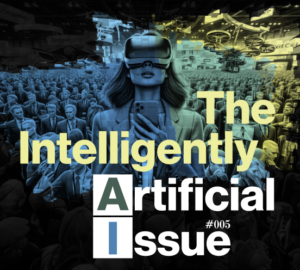Expect
fewer
managers
and
direct
reports
From the editor: This overheard passage comes from a virtual event that featured a productive disagreement between members. In this piece you’ll see two opposing perspectives about the well-worn assumption that AI will replace labor. As always, ON_Discourse operates under the Chatham House rule—no attribution of perspectives without explicit consent.
Yes, and here's why
AI could accelerate the flattening of organizations
MBA programs didn’t prepare anyone for this. The accelerating adoption of AI tools could completely redefine how businesses organize. The first dominos to fall will be the HR and management layers. At first glance this seems like a bad thing, but it’s not…
Growing
without
headcount
Today’s model is fundamentally stupid—I don’t mean that pejoratively. Managers are incentivized to grow their teams regardless of need. Why? Having more direct reports leads to more promotions and more raises for managers. This sustains a conventional growth model that leads to overhiring and layoffs.
AI tools will disrupt the need for companies to grow their workforces by injecting intelligence and data into this dumb growth model. The knee-jerk reaction to such a shift typically sounds like, “If we don’t grow our teams, how are we ever going to get promoted and have a career path?”
This thinking is rooted in the assumption that a hierarchy and a climbing mentality are required for growth. AI tools will reveal that this is not the case, and adding people will not be seen as a requirement for revenue growth.
Instead, revenue growth could be achieved while keeping headcount flat, or even through reductions. Many non-revenue-generating roles, like in HR and middle management, will start to disappear. Active executors that have a more direct relationship with the bottom line of the organization will replace them.
Focusing
on what
matters
People managers who remain will have more time to focus on their hands-on efforts. These individuals were good enough at doing something to get promoted. Their employers will develop metrics and goals around those skills, unlocking an entrepreneurial spirit.
Instead of adding more people to manage, people managers will become more focused on outcomes. AI tools could help incentivize individual contributors based on what uniquely motivates them and the impact they can make.
On the HR side, plenty of functions could be handled by AI, possibly with less bias, more clarity, and more transparency. The processes could be opened up and deployed more equally across teams.
More layers and hierarchy only distract from revenue-generating functions and complicate decision-making.
Better
outcomes
This has important knock-on effects. Non-revenue-generating roles pull businesses further away from their customers and the outcomes they want. More layers and hierarchy only distract from revenue-generating functions and complicate decision-making, whereas fewer non-essential roles could mean more focus on translating user needs to products and services.
Some argue that AI can just help bring all the data needed for decisions to the top of the organization, but that’s backward. Why bother having such a structure? Instead, flatten your organization and empower more people to make decisions closer to the customer.
AI tools will disrupt the need for companies to grow their workforces by injecting intelligence and data into this dumb growth model. The knee-jerk reaction to such a shift typically sounds like, “If we don’t grow our teams, how are we ever going to get promoted and have a career path?”
This article is part of The Intelligently Artificial Issue, which combines two big stories in consumer tech: AI and CES.
Read more from the issue:
USER EXPERIENCE
Augmented Intelligence: from UX to HX
Will prompting replace browsing?
The car is the gateway drug to a voice-first acceleration
The prompt interface needs a redesign
RE-ORG
AI will brainstorm your next reorg
Expect fewer managers and direct-reports
AI is too immature for your business
AI is not a new revolution
BRAND
Should we ignore the hardware?
Can AI help consumers love your brand?
Your brand doesn't have enough data for AI
Can LLMs be optimized like search results?
Good brands will integrate more friction into their C X
I totally disagree
AI will need many more managers
- No conventional MBA graduates in management are prepared for the AI era.
- The proliferation of AI products and services will change management structures.
The rest, you have backwards. The number of managers is going to grow significantly in the near future. We are going to need more people to manage the adolescent that is AI.
Adding AI products and services to the toolbox creates a new output signal that businesses need to wrangle. This in turn calls for another human layer to figure out how the AI tools are performing and how they are changing the way we ingest new information.
We are going to need more people to manage the adolescent that is AI.
AI tools could create
a lot more noise
for decision makers
Because we have more signals coming in, we will ultimately make better decisions. Those additional signals, however, require more data science teams, more linguists, more operational people, more people managing how the models are performing, more people monitoring any human bias that is going into those models, and so on.
Industry expertise will remain vital. Companies will demand subject matter experts who decipher the truth within AI-generated content.
There are limitations to what AI can produce. Only humans can figure out that last critical bit. Non-technical roles, filled by creative and culturally-aware individuals who bridge technical jargon and diverse global perspectives, will grow in importance.
In fact, we might see high demand for managers who can attract the right mix of these unique, multidisciplinary groups of people, and know how to get them to work together productively and efficiently. AI simply doesn’t have the people skills to manage divergent perspectives and disciplines into a cohesive group.
More technology will once again require more humans to manage it.
